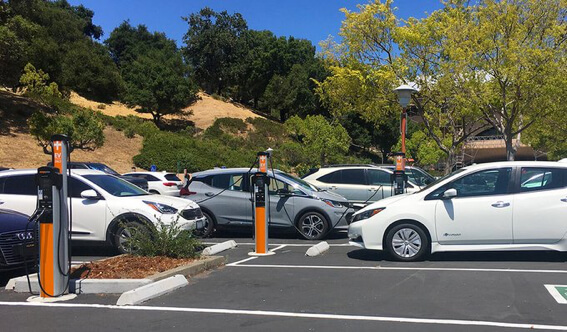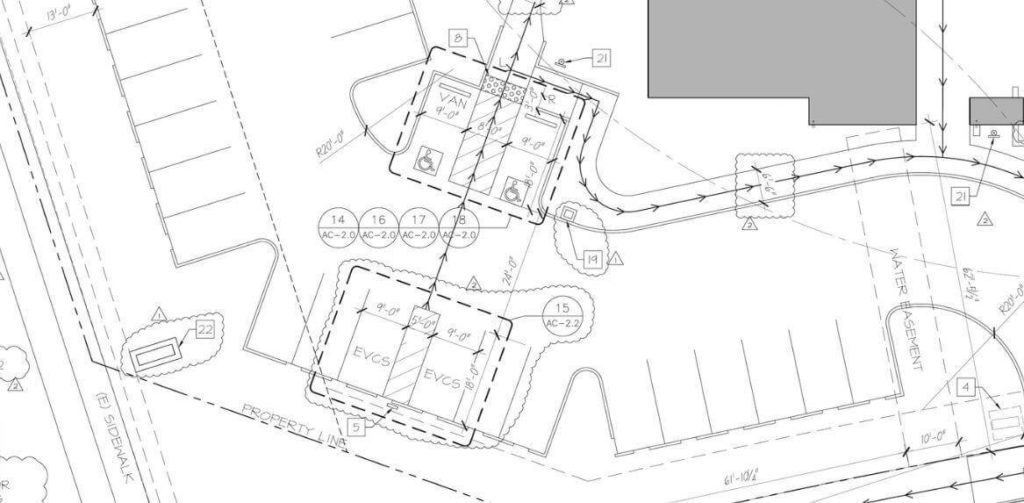There are many benefits to installing electric vehicle (EV) charging stations at hotels, offices, apartments, or condos. In fact, here are three benefits to installing stations at Airbnb or vacation rentals. For many business owners, providing charging for customers, residents, or employees is well worth the initial expense. Benefits of installing EV charging stations include, but not limited to, attracting employee talent, retaining tenants, increasing customer dwell time, and much more.
But of course, money matters. And, like other site improvements, charging stations are not cheap. In addition, they are much more complicated than purchasing the hardware. There are also site work, design and engineering, permitting, electrical upgrades, and labor costs. However, with careful planning, many of these costs can be minimized. In some cases, with the help of rebates, the cost to install EV charging stations could be nearly or completely covered.
So how much does it cost to install EV charging stations? Here is a breakdown of EV charging stations installations. It is key to note that these costs are estimated and general. There are many, many variables and each site will experience different costs. That being said, this breakdown shall provide a good glimpse of what to expect. And for clarity, these costs pertain only to Level 2 charging stations, which are typical at office, commercial, and residential locations.
Cost Breakdown to Install EV Charging Stations
There are four components that play a role in the cost to install EV charging stations. They are as follows:
- Electric vehicle supply equipment (EVSE)
- Design and Engineering
- Permitting
- Construction
EVSE
There are a couple different names for the hardware, such as electric vehicle supply equipment (EVSE), charging station, and charger. All being the same, the hardware is the physical device that safely transfers electricity to the car via a plug.
There are also several different manufacturers such as Chargepoint, EVbox, Enel X, Tesla, Blink, and much more. Each manufacturer provides a number of different features with their chargers. Some are basic, while others are sophisticated.

Depending on the manufacturer and product line, the hardware costs range from $1,200 to $3,500 per port. The reason why ‘per port’ is used rather than ‘per charger’ is that some chargers include two ports, which can charge two different electric cars at once.
Design and Engineering
Before a contractor can get started with the install, they will need two things: 1) construction drawings and 2) a permit. To the former, the construction drawings include the design and engineering of the charging stations.
This work is completed by an architect and electrical engineer. The architect is responsible for the site design and American with Disabilities Act (ADA) compliance. The electrical engineer is responsible for the load calculations, single line diagrams, and other electrical information.

Since a charging station is considered an amenity per most building codes, it is required to have certain accommodations for accessibility. This means that larger ADA stalls with loading aisles, accessible path of travel from the charging station to the building entrance, and other site improvements may be required. If such upgrades are required, they will directly affect the cost of construction.
The cost of design and engineering vary on the project scope of work. For example, larger projects may require a significant amount of time from the design team due to the complexity compared to a smaller project. For a rough ballpark, expect to pay around $1,500 to $5,000 per project.
Permitting
Once the design and engineering is completed, the next step is to get a permit from the Authority Having Jurisdiction (AHJ). This can be a city or county depending on the project location.
Some jurisdictions have streamlined and reduced fees for charging stations as a means to encourage site owners to install them. Nevertheless, the permit cost is typically a minor fee relative to the project. Anticipate to pay around $150 to $500 for a permit.
Construction
Construction costs include everything needed to install the chargers. This includes, but not limited to, trenching, conduit, wire, circuit breakers, panel upgrades, concrete cut and patch, asphalt cut and patch, signage, striping, bollards, labor, and more.
Each site varies wildly as you may have expected. Some jobs can be very simple with easy access to the electrical panel and short distance to the parking stalls. Other sites can be complex with transformer upgrades or long distances from the panel to the parking stall.
Additionally, another factor that plays a role into the cost to install EV charging stations is if the site is new or existing. For new sites, the site work is unfinished, therefore, it is much cheaper to install conduit than at existing sites where concrete and/or asphalt need to be cut and patched.
In general, it will cost around $1,200 per charger at new sites and around $3,500 per charger at existing sites.
Estimated Cost to Install EV Charging Stations
As previously mentioned, there are many variables that play a role in determining the cost to install EV charging stations. Factors such as hardware features, site work, ADA upgrades, or labor rates all affect the total cost.
As a starting point, expect to pay around $4,600 to $6,900 per port. After further investigation, you may determine your project costs will be more or less. And with available rebates, the cost to install EV charging stations could be partially or completely covered. If rebates are available in your area, it is highly recommended to take a closer look to see if EV charging stations are right for your hotel, office, apartment, or condo complex.

Operational Costs of EV Charging Stations
There are three components to the operational costs of EV charging stations. They are as follows:
- Networking
- Electricity
- Maintenance
Networking
Similar to cell phones, charging stations require networking in order to provide smart capabilities such as payment processing, access control, session limits, and more. Getting a charging station that is capable of networking is one of the feature-rich chargers described in the previous section.
And also like hardware, there are a number of networking providers such as Chargepoint, Enel X, Amp Up, and several others. It is important to note that some chargers are what is considered as a closed network while others are an open network. Going back to the cell phone analogy, an open network charger is just like cell phone networks where when you purchase an iPone, you can select whichever cellular provider you wish. With a closed network, you are locked-in to the manufacturer’s network. A quick way to tell the difference is if the charger includes OCPP (Open Charge Point Protocol).
All this said, software is not entirely necessary to operate a charging station. Manufacturers such as Bosch or Clipper Creek sell chargers without software capabilities. Although, with networking, anyone can pull up to the charger and initiate a charging session to the expense of the site host. If controlling access or passing off electricity cost to the EV driver is wanted, a networked charger is required.
Software costs vary depending on the features of the network and terms of service. In general, expect around $100 to $300 per port per year.
Electricity
Either the EV driver or the site host pay for the electricity used at a charging station. Whichever does, it is usually no more than a few dollars per charging session. Therefore, in many instances, site hosts cover the bill in efforts to entice employees, residents, or customers. The rationale is free charging is a nice amenity for any type of business. Should the site host offer free charging, they can expect to see positive results with their EV driving patrons.
If the goal is to pass off all costs to the EV driver, then this can be done with networking. As stated previously, one of the features of networking is payment processing. Site hosts can schedule whatever rates they like just like gas stations for internal combustion engine vehicles. Even more, site hosts can add additional fees to cover the cost of networking and maintenance. Even if the charging station requires payment, they will still be used as charging access is in high demand with electric cars.
The cost of electricity varies on local electricity rates. Per the Energy Information Agency, as of March 2021 the national average for commercial electricity rates are $0.11/kWh to charge. By using a typical EV efficiency of 3.5 mi/kWh, this would yield $0.03/mi. In comparison, the gas national average is $3.02/gal. Using a typical gas car efficiency of 25 MPG, this would yield $0.12/mi to fuel. Therefore, charging an EV at a public charging station would be 120% cheaper than fueling a gas car at a gas station.
Maintenance
The last cost associated with installing EV charging stations is maintenance. This cost is often forgotten as up to this point the charger is installed, activated, and ready to charge electric cars. While it may be “out of sight, out of mind” maintenance is a notable expense for site owners.
Initially, there won’t be any maintenance costs as the equipment is brand new. Should there be any issues, it will be covered with the product and labor warranty. Over time, the equipment will have seen better days. Most likely, the plug will be the first part needing servicing. Since the plug is mechanical and is used over and over with each charging session, it will, at some point, need to be replaced.

There are two paths to take with maintenance: 1) purchase a maintenance plan with the contractor or equipment vendor or 2) pay as you go. Whichever path you or your business select, expect to budget a couple hundred dollars per year for various maintenance needs.
Estimated Operational Costs for EV Charging Stations
Overall, the total operational costs for EV charging stations is quite minimal. This is especially true if the networking and electricity fees are passed off to the EV driver, which is very typical. Therefore, really the only cost the site host needs to consider is the maintenance. And as we detailed, there really aren’t a whole lot of parts that will fail. In the event that they do break, it usually isn’t that significant of a cost. The many benefits of providing EV charging stations will very much outweigh the minimal operational costs.
Closing Thoughts
Hopefully these estimated costs are around what you were expecting. Even if they are a bit higher, with networking, the cost of electricity, networking, and the installation cost can all be covered by the EV drivers each time they charge.
If you or your business are interested in installing EV charging stations, but unsure if it will be within your budget, let us know and we can provide a detailed feasibility study. Within the feasibility study, we’ll provide recommendations on the hardware and software, provide recommendations on the number of charging stations, plan where the charging stations will be installed, and, lastly, estimate total project costs for your specific site.
Alternatively, if you are ready to go, we also offer project management services where we coordinate the entire project on your behalf. This saves you and your employees value time and energy.
You can get started with a free estimate to either service here!

Hi there! I’m the founder and project manager at Charged Future: the EV charging consultancy. Charged Future helps businesses achieve their EV charging goals. Specifically, I serve as the project manager for your EV charging project, which can save you both time and money! Additionally, I can search and apply to all eligible rebate applications, which can typically cover a large portion of the project cost.


